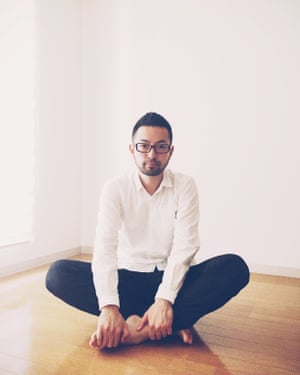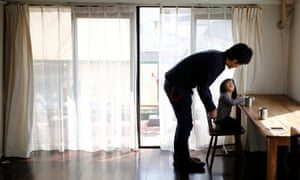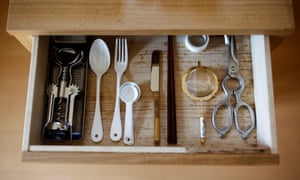Let me tell you a bit about myself. I’m 35 years old, male, single, never been married. I work as an editor at a publishing company. I recently moved from the Nakameguro neighbourhood in Tokyo, where I lived for a decade, to a neighbourhood called Fudomae in a different part of town. The rent is cheaper, but the move pretty much wiped out my savings.
Some of you may think that I’m a loser: an unmarried adult with not much money. The old me would have been way too embarrassed to admit all this. I was filled with useless pride. But I honestly don’t care about things like that any more. The reason is very simple: I’m perfectly happy just as I am.
The reason? I got rid of most of my material possessions.
Minimalism is a lifestyle in which you reduce your possessions to the least possible. Living with only the bare essentials has not only provided superficial benefits such as the pleasure of a tidy room or the simple ease of cleaning, it has also led to a more fundamental shift. It’s given me a chance to think about what it really means to be happy.
We think that the more we have, the happier we will be. We never know what tomorrow might bring, so we collect and save as much as we can. This means we need a lot of money, so we gradually start judging people by how much money they have. You convince yourself that you need to make a lot of money so you don’t miss out on success. And for you to make money, you need everyone else to spend their money. And so it goes.
So I said goodbye to a lot of things, many of which I’d had for years. And yet now I live each day with a happier spirit. I feel more content now than I ever did in the past.
Minimalism is a lifestyle in which you reduce your possessions to the least possible. Living with only the bare essentials has not only provided superficial benefits such as the pleasure of a tidy room or the simple ease of cleaning, it has also led to a more fundamental shift. It’s given me a chance to think about what it really means to be happy.
We think that the more we have, the happier we will be. We never know what tomorrow might bring, so we collect and save as much as we can. This means we need a lot of money, so we gradually start judging people by how much money they have. You convince yourself that you need to make a lot of money so you don’t miss out on success. And for you to make money, you need everyone else to spend their money. And so it goes.
So I said goodbye to a lot of things, many of which I’d had for years. And yet now I live each day with a happier spirit. I feel more content now than I ever did in the past.

‘Here’s a look in my closet, from a down jacket to a suit, some white shirts, and the few pairs of trousers that match in a simple style. I am aiming to create my own uniform with a signature style like Steve Jobs had’
I wasn’t always a minimalist. I used to buy a lot of things, believing that all those possessions would increase my self-worth and lead to a happier life. I loved collecting a lot of useless stuff, and I couldn’t throw anything away. I was a natural hoarder of knickknacks that I thought made me an interesting person.
At the same time, though, I was always comparing myself with other people who had more or better things, which often made me miserable. I couldn’t focus on anything, and I was always wasting time. Alcohol was my escape, and I didn’t treat women fairly. I didn’t try to change; I thought this was all just part of who I was, and I deserved to be unhappy.
My apartment wasn’t horribly messy; if my girlfriend was coming over for the weekend, I could do enough tidying up to make it look presentable. On a usual day, however, there were books stacked everywhere because there wasn’t enough room on my bookshelves. Most I had thumbed through once or twice, thinking that I would read them when I had the time.
At the same time, though, I was always comparing myself with other people who had more or better things, which often made me miserable. I couldn’t focus on anything, and I was always wasting time. Alcohol was my escape, and I didn’t treat women fairly. I didn’t try to change; I thought this was all just part of who I was, and I deserved to be unhappy.
My apartment wasn’t horribly messy; if my girlfriend was coming over for the weekend, I could do enough tidying up to make it look presentable. On a usual day, however, there were books stacked everywhere because there wasn’t enough room on my bookshelves. Most I had thumbed through once or twice, thinking that I would read them when I had the time.

‘I was miserable, and I made other people miserable, too’ … Fumio Sasaki
The closet was crammed with what used to be my favourite clothes,most of which I’d only worn a few times. The room was filled with all the things I’d taken up as hobbies and then gotten tired of. A guitar and amplifier, covered with dust. Conversational English workbooks I’d planned to study once I had more free time. Even a fabulous antique camera, which of course I had never once put a roll of film in.
Meanwhile, I kept comparing myself with others. A friend from college lived in a posh condo on newly developed land in Tokyo. It had a glitzy entrance and stylish Scandinavian furniture. When I visited, I found myself calculating his rent in my head as he graciously invited me in. He worked for a big company, earned a good salary, married his gorgeous girlfriend, and they’d had a beautiful baby, all dressed up in fashionable babywear. We’d been kind of alike back in college. What had happened, I thought? How did our lives drift so far apart?
Or I’d see a pristine white Ferrari convertible speeding by, showing off, probably worth twice the value of my apartment. I’d gaze dumbly at the car as it disappeared from view, one foot on the pedal of my secondhand bicycle.
I bought lottery tickets, hoping I could catch up in a flash. I broke up with my girlfriend, telling her I couldn’t see a future for us in my sad financial state. All the while, I carefully hid my inferiority complex and acted as though there was nothing wrong with my life. But I was miserable, and I made other people miserable, too.

Three shirts, four pairs of trousers: meet Japan's 'hardcore' minimalists
It may sound as if I’m exaggerating when I say I started to become a new person. Someone said to me: “All you did is throw things away,” which is true. But by having fewer things around, I’ve started feeling happier each day. I’m slowly beginning to understand what happiness is.
If you are anything like I used to be – miserable, constantly comparing yourself with others, or just believing your life sucks – I think you should try saying goodbye to some of your things. Yes, there are certainly people who haven’t ever been attached to material objects, or those rare geniuses who can thrive amid the chaos of their possessions. But I want to think about the ways that ordinary people like you and me can find the real pleasures in life. Everyone wants to be happy. But trying to buy happiness only makes us happy for a little while. We are lost when it comes to true happiness.
After what I’ve been through, I think saying goodbye to your things is more than an exercise in tidying up. I think it’s an exercise in learning about true happiness.
Maybe that sounds grandiose. But I seriously think it’s true.



